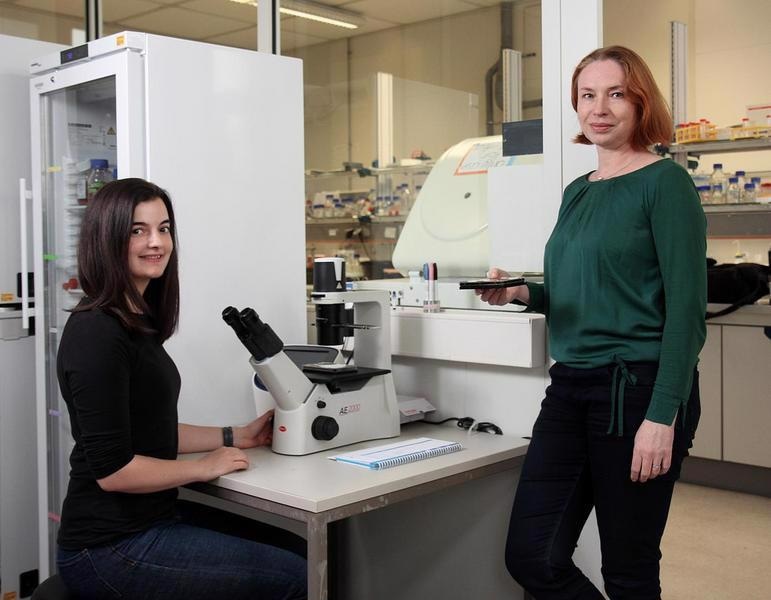Human cells have two sets of chromosomes (diploid). It is possible, however, that cells have a tetraploid (quadruple) set. They usually stop dividing and die; however, certain cells are immune to this destiny. Many mutations arise in cells shortly after they are produced, according to an international team of experts, including a study group from the Technische Universität Kaiserslautern (TUK).
 Prof. Dr. Zuzana Storchová (right) and her colleague Kristina Keuper. Image Credit: Technische Universität Kaiserslautern/Koziel.
Prof. Dr. Zuzana Storchová (right) and her colleague Kristina Keuper. Image Credit: Technische Universität Kaiserslautern/Koziel.
This is due to a deficiency in proteins that are required for the reproduction of genetic material. Errors in this mechanism cause mutations which can lead to tumor growth. The research was published in the journal Nature.
There are 46 chromosomes in a healthy human cell: a duplicate pair of 22 chromosomes plus two sex chromosomes (XX or XY). Cancer cells are in a distinct position. Various genetic alterations can be detected here, such as missing chromosomal portions or several copies of the same chromosome.
However, there is still a lack of scientific proof as to why there has been such a rise in the number of errors. New research conducted by the French InstituteCurie Research Center in Paris in partnership with Professor Dr Zuzana Storchová’s group at the Technical University of Kaiserslautern (TUK) and a group from the Dutch University of Groningen provides one explanation.
The focus was on tetraploid chromosomal sets in cells.
A defect that leads to tetraploid cells occurs in about one in a thousand cells, which means it is quite common. While most tetraploid cells die, some can survive and contribute to the formation of cancer cells. We wanted to know what happens in them immediately after they are formed in the first cell cycle.”
Zuzana Storchová, Study Co-Author and Professor, Department of Molecular Genetics, Technical University of Kaiserslautern
The researchers examined these cells as soon as they turned tetraploid. Kaiserslautern professor stated, “We found that there many errors had occurred very soon. There were various DNA damages and mutations present.”
After that, researchers examined the root causes. “We found that cancer cells are not able to carry out replication, i.e. the duplication of genetic material, without errors,” says researchers from Kaiserslautern. However, this is necessary for cells to continue to divide.
The researchers discovered that the cells are no longer producing enough of the proteins required for replication. The experiment was carried out on a variety of cell types, and identical observation was made in each of them.
The mechanism was previously unknown; it explains why so many mutations arise so quickly in tetraploid cells.”
Zuzana Storchová, Study Co-Author and Professor, Department of Molecular Genetics, Technical University of Kaiserslautern
As a result, the surviving tetraploid cells collect a large number of mutations, which is likely why they might encourage tumor growth.
The research was conducted using techniques that have just been available for a few years. It would not have been able to arrive at the results without them. The researchers were able to evaluate the genomic alterations in a single cell using the Dutch team’s single-cell sequencing method. Storchová’s team also looked at how DNA replication differs in tetraploid cells versus healthy diploid cells using single-molecule analysis.
Source:
Journal reference:
Gemble, S., et al. (2022) Genetic instability from a single S-phase after whole genome duplication. Nature. doi.org/10.1101/2021.07.16.452672